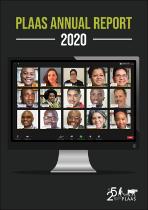| dc.description.abstract | In our previous Annual Report, I remarked that 2019 seemed to be a year of the gathering storm. Little did we know what was coming. As we looked forward to 2020, we knew that it was going to be a significant year. For one thing, PLAAS was entering its 25th year – a marker of organisational resilience and maturity. For another, Ben Cousins, who had founded PLAAS and who had continued to play a key part in its direction and leadership – even after he stepped down as Director and took up the South African Research Chairs Initiative (SARChI) Chair in Poverty, Land and Agrarian Studies – was due to retire. Prof Ruth Hall, who had until then led our work on land reform in South Africa and “land grabs” elsewhere on the continent, was getting ready to step into his shoes. Ursula Arends, who had ably held the administrative reins, was stepping down after almost 20 years, as was our financial manager, Trevor
Reddy: their roles were to be taken over by a single Finance and Operations Manager. So, change was afoot. | en_US |

